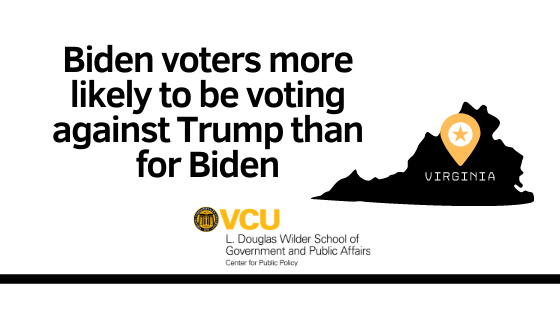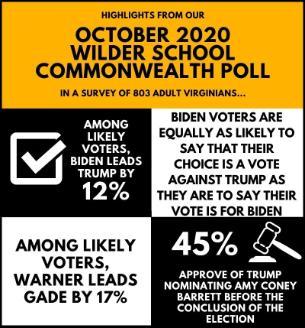News
Biden voters more likely to be voting against Trump than for Biden

FOR IMMEDIATE RELEASE
October 29, 2020
FOR MORE INFORMATION CONTACT:
Farrah Stone, Ph.D.
Poll director
Phone: (804) 305-3447
Email: stonefn@vcu.edu
RICHMOND, Va. (Oct. 29, 2020) — While Democrat Joe Biden remains ahead by double digits in Virginia, his voters are more likely to see the choice as a vote against President Donald Trump than a vote for Biden, according to a new statewide poll conducted by the Center for Public Policy at the L. Douglas Wilder School of Government and Public Affairs at Virginia Commonwealth University.
Biden voters are equally as likely to say their vote is an anti-Trump choice as they are to saying it is pro-Biden, each with 49%. Independent voters are more likely to view their choice of Biden as a vote against Trump with 60%, compared to 41% of Democrat Biden voters. Trump voters are more likely to feel their vote is for Trump, with 77%, and only 20% saying their vote is against Biden.
Democrats Biden and Sen. Mark Warner maintain their double-digit leads in Virginia heading into the final days of the election. Biden is ahead of Trump by 12 percentage  points (51% to 39%) and Warner is ahead of Republican Daniel Gade by 17 points (55% to 38%). These numbers are largely unchanged from polls released in September and July by the Wilder School. Gender and region remain significant to the vote choice for both races. Minorities continue to show strong support for Biden and Warner with more than 7-in-10 supporting the Democrats.
points (51% to 39%) and Warner is ahead of Republican Daniel Gade by 17 points (55% to 38%). These numbers are largely unchanged from polls released in September and July by the Wilder School. Gender and region remain significant to the vote choice for both races. Minorities continue to show strong support for Biden and Warner with more than 7-in-10 supporting the Democrats.
In the presidential race, women are more likely to prefer Biden over Trump (54%-36%) and men prefer Biden over Trump by a smaller margin (48%-43%). Regionally, Biden has large leads in Northern Virginia (61%-27%) and Tidewater (58%-28%) and Trump has large leads over Biden in the West (62%-32%) and Northwest (55%-41%). Independents are breaking toward Biden by 9 percentage points (47%-38%), with 11% remaining undecided.
In the U.S. Senate contest, gender and region follow the same trend as the presidential race. And Warner enjoys a greater level of support from independents, with a 19 percentage point lead over Gade (54%-35%).
The poll also provides additional insight into Virginians’ opinions on the Amy Coney Barrett nomination and Trump’s handling of COVID-19.
“Virginia voters are reflecting a trend towards Biden and the Democrats. This seems to be more of a vote against Trump, than a vote for Biden,” said L. Douglas Wilder, the 66th governor of Virginia.
“Our polling across 2020 appears to reaffirm the shift we have seen over the past 12 years in Virginia — that the commonwealth is less a purple state and becoming a solidly blue state,” said Farrah Stone, Ph.D., director of the Commonwealth Poll at the Wilder School. “Still, voters for Trump are very much supportive of the president, while Biden voters are just as likely to support their candidate as they are to be anti-Trump. There is certainly a question of whether the likely Virginia voter supports Democratic policy as much as the Democratic alternative in this race.”
The Wilder School Commonwealth Poll is a featured 2020 Presidential Election Poll by CNN, approved based on a rigorous review of methodologies and assumptions that ensure that CNN-cited polling entities are employing the gold standard in public opinion research. This is the fourth and final presidential poll in 2020 for the Wilder School.
Among the poll’s key findings:
- Virginians are split on now-Justice Amy Coney Barrett’s nomination just weeks before the election. Forty-five percent of Virginians strongly or somewhat approve of Trump nominating Barrett before the conclusion of the election and 48% strongly or somewhat disapprove of the decision. Partisan differences are stark with 84% of Democrats strongly or somewhat disapproving of the decision to nominate and 92% of Republicans strongly or somewhat approving. Independents are evenly split with 44% approving and 44% disapproving. Seventy-three percent of Virginians say the nomination will have no impact on their vote choice in the presidential election.
- Trump’s COVID-19 diagnosis has little impact on opinions about the election or handling the pandemic. While recent media reports have discussed the importance of the coronavirus on the election, almost 8-in-10 Virginians (79%) don’t see Trump’s COVID-19 diagnosis affecting their vote choice. Only 14% say it will make them more likely to vote for Biden. A larger percentage, 34%, say the diagnosis made them feel less confident in Trump’s handling of the pandemic. Over half (55%) say it had no impact. Opinion on Trump’s handling of the government response to the pandemic remained relatively unchanged since the July 2020 Wilder School poll, with 55% somewhat or strongly disapproving and 41% somewhat or strongly approving.
The poll, a telephone survey of 803 adults living in Virginia was conducted between Oct. 13-22. It has an estimated margin of error of 4.87 percentage points for all adults sampled, and 4.93 percentage points for likely voters. The entire report with detailed analysis tables and graphics can be found at https://oppo.vcu.edu/policy-poll/.
ABOUT THE WILDER SCHOOL AND THE CENTER FOR PUBLIC POLICY
The L. Douglas Wilder School of Government and Public Affairs, named for the nation’s first African-American elected governor, is a top-50 nationally ranked public affairs school. Located blocks from the state Capitol in Richmond, Virginia, the school enrolls about 1,000 undergraduates and 400 graduate students in eight academic programs. The Wilder School’s 10,000-plus alumni work across the public, private and nonprofit sectors. Drawing on the wide-ranging expertise of Wilder School faculty, the Center for Public Policy's programs provide diverse public-facing services including leadership development and training, economic and policy impact analysis, survey insights and program evaluation to clients in state and local governments, nonprofit organizations, businesses and the general public, across Virginia and beyond. For more, please visit https://wilder.vcu.edu/center-for-public-policy/.